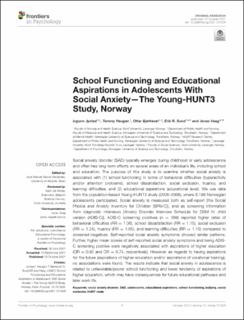| dc.contributor.author | Jystad, Ingunn | |
| dc.contributor.author | Haugan, Tommy | |
| dc.contributor.author | Bjerkeset, Ottar | |
| dc.contributor.author | Sund, Erik | |
| dc.contributor.author | Vaag, Jonas Rennemo | |
| dc.date.accessioned | 2022-10-13T09:17:15Z | |
| dc.date.available | 2022-10-13T09:17:15Z | |
| dc.date.created | 2021-09-14T20:13:09Z | |
| dc.date.issued | 2021 | |
| dc.identifier.citation | Frontiers in Psychology. 2021, 12 . | en_US |
| dc.identifier.issn | 1664-1078 | |
| dc.identifier.uri | https://hdl.handle.net/11250/3025817 | |
| dc.description.abstract | Social anxiety disorder (SAD) typically emerges during childhood or early adolescence and often has long-term effects on several areas of an individual's life, including school and education. The purpose of this study is to examine whether social anxiety is associated with (1) school functioning in terms of behavioral difficulties (hyperactivity and/or attention problems), school dissatisfaction, social exclusion, truancy, and learning difficulties, and (2) educational aspirations (educational level). We use data from the population-based Young-HUNT3 study (2006–2008), where 8,199 Norwegian adolescents participated. Social anxiety is measured both as self-report [the Social Phobia and Anxiety Inventory for Children (SPAI-C)], and as screening information from diagnostic interviews [Anxiety Disorder Interview Schedule for DSM IV: child version (ADIS-C)]. ADIS-C screening positives (n = 388) reported higher rates of behavioral difficulties (RR = 1.06), school dissatisfaction (RR = 1.15), social exclusion (RR = 1.24), truancy (RR = 1.05), and learning difficulties (RR = 1.10) compared to screened negatives. Self-reported social anxiety symptoms showed similar patterns. Further, higher mean scores of self-reported social anxiety symptoms and being ADIS-C screening positive were negatively associated with aspirations of higher education (OR = 0.92 and OR = 0.74, respectively). However, as regards to having aspirations for the future (aspirations of higher education and/or aspirations of vocational training), no associations were found. The results indicate that social anxiety in adolescence is related to unfavorable/poorer school functioning and lower tendency of aspirations of higher education, which may have consequences for future educational pathways and later work life. | en_US |
| dc.language.iso | eng | en_US |
| dc.publisher | Frontiers Media | en_US |
| dc.rights | Navngivelse 4.0 Internasjonal | * |
| dc.rights.uri | http://creativecommons.org/licenses/by/4.0/deed.no | * |
| dc.title | School Functioning and Educational Aspirations in Adolescents With Social Anxiety—The Young-HUNT3 Study, Norway | en_US |
| dc.type | Peer reviewed | en_US |
| dc.type | Journal article | en_US |
| dc.description.version | publishedVersion | en_US |
| dc.source.pagenumber | 11 | en_US |
| dc.source.volume | 12 | en_US |
| dc.source.journal | Frontiers in Psychology | en_US |
| dc.identifier.doi | 10.3389/fpsyg.2021.727529 | |
| dc.identifier.cristin | 1934332 | |
| dc.description.localcode | Copyright © 2021 Jystad, Haugan, Bjerkeset, Sund and Vaag. This is an open-access article distributed under the terms of the Creative Commons Attribution License (CC BY). | en_US |
| dc.source.articlenumber | 727529 | en_US |
| cristin.ispublished | true | |
| cristin.fulltext | original | |
| cristin.qualitycode | 1 | |

